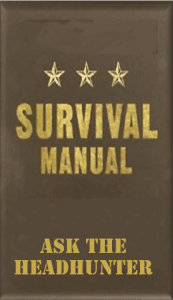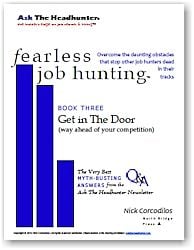In the February 23, 2016 Ask The Headhunter Newsletter, a reader is ready to chuck it all to save his sanity. Should he?
Question
I’ve been a project manager running million dollar software projects for 15 years. However, I’m sick of the stress, never-ending deadlines, and frantic pace of technology. I’m 41 and I can’t keep this up for another 10 years.

I’m trained to recognize classic burn-out syndrome but dealing with it in myself isn’t easy. I find myself wanting to go pound nails for a builder or mow lawns or just to do something mindless. I think I could step out of corporate life for a while and come back later, but I will have lost my contacts. What’s the answer? “Would you like some fries with that, Sir?”
Nick’s Reply
No, no fries… but welcome to burn-out. It happens to many talented people. It’s nature telling you to flip the burger because one side is done. It’s time for the other side.
The conventional obstacles
Before I offer you suggestions about how to overcome the resume gaps you’re about to create, so you can land a new job later, let’s consider the obstacles you’re going to face. I’m sure you’ve read or heard the conventional wisdom about what you’re suggesting. Let’s play it:
- It’s harder to get a job if you don’t have a job.
- Employers discriminate against the unemployed.
- If you stop working, your skills will go stale.
- When you leave the work world, your network dries up.
- Gaps in your resume are the kiss of death.
- And so on…
To one degree or another, all those statements are true, of course. But it’s also true that we’re all gonna die… so what’s the point of living? (Consider the killer quote from Ring Lardner.)
What’s the point of being burned out and miserable?
The conventional wisdom doesn’t matter when you’ve got good reasons to do what you’re talking about: You’re free to get out of the kitchen and go kick the can for a while. Give yourself a break, or you will indeed burn up.
Jobs can be replaced, but you get only one body, one mind. There’s no reason to lose your contacts — it’s not hard to maintain the best ones when you take time off. Your skills need not dry up. You can learn new skills.
Afraid to get off the burner?
I was about 40 when I chucked it all to write a book, start a website, and follow my gut. Yes, it was a risk. But getting off the burner is necessary when you feel burnt. With the relief will come new experiences and new choices you forgot you had.

If you’re good at what you do now, I can almost assure you that you’ll be good at whatever you decide to do after some time off. And if you stay in touch with your best contacts, you’ll always have the support system you need to succeed again. More important, if you don’t get lazy, during the time you take off you’ll make loads of new contacts that can help you get back to work when the time comes.
Here’s the thing: Conventional wisdom is for the conventional person. It’s for whoever wants to nail themselves to a job the rest of their lives. And there’s nothing wrong with that (even if I apply a derogatory metaphor to it). If you’re going to be unconventional — and take time off — then you can’t let the rules apply to you. You must forge your own rules and methods for getting back to work later.
And that’s what Ask The Headhunter is all about. My test of the value of any method for landing a job is this: Does it make enough fundamental business sense that it can work under any circumstances — including taking a break?
Screw convention
I don’t like tricky job-search methods intended to mollify HR managers and personnel jockeys who scan credentials for excuses to reject someone without meeting them. For example, clever resumes that hide your gaps in employment, “functional resumes” that hide your age, and “consulting gigs” that cover up your unemployment.
There’s only one way to get a job under any circumstances without relying on luck, or faking it:
Get someone that knows the person in charge to introduce you and vouch for you, then don’t waste the employer’s time. Show why hiring you will pay off, so the manager won’t be able to do anything but hire you.
Who cares if you’re not employed?
Because what’s far, far worse is staying in the job that’s burning you out, and then showing up at job interviews shell-shocked and demoralized. Then no one’s going to hire you.
My vote — assuming you’ve got your finances in order — is to go away and come back later. Screw convention.
Here’s the secret: If you’re good at your work, then trust your ability to earn a living and to do useful work again. When you’re done kicking the can, you’ll be able to dust yourself off and figure out again what to do next, after flipping burgers and offering fries with that…
Life is short. Do what comes next now, and I think you’ll be better able to do what comes after that.
The Field Guide
Need help getting back to work after you’ve been away for a while — whatever the reason? Maybe you’ve just got gaps in your resume that raise red flags.
Here’s an Ask The Headhunter Field Guide that I’ve compiled from some of the best ATH resources. It’s more than you probably need, but I hope some of these tips will help you get introduced to the right employer and show why hiring you will pay off — even if you’ve been out of the market a long time. All are free online except where indicated:
- When you’re ready to get back to work, what’s the right job for you?
The Interview, or The Job?
- Been out of work a while? How can your old experience win a new job?
See “How To Start A Job Search,” pp. 1-2: Fearless Job Hunting, Book 1: Jump-Start Your Job Search ($8.95)
- Where’s the best place to find several jobs, not just one?
Pursue Companies, Not Jobs
- Afraid you’ll lose your contacts and your network?
Take Care of Your References
- How can you network your way into a job better than your competitors?
See “A Good Network Is A Circle of Friends.” The full version is in Answer Kit: How Can I Change Careers? ($16.95)
- Got gaps in your resume? Replace them with value.
How To Build Value On Your Resume
- Don’t know anyone who might help you?
Meet the right people
- Overwhelmed by all the jobs online? Here’s a dirty little secret…
There aren’t 400 jobs for you
- Want to avoid losing all your best contacts?
Tell me who your friends are
- Want to know who are the best new contacts to cultivate?
Who does the work you want to do?
- You don’t know the Zen approach to landing the right job?
Don’t look for a job
- Have no idea how anybody actually meets anybody who can help them get a job?
I don’t know anybody
- Facing age discrimination after you took time off?
Too Old to Rock & Roll?
- Everyone keeps beating you to the jobs you want?
See “Uncover Hidden Jobs,” pp. 3-4: Fearless Job Hunting, Book 3: Get In The Door (way ahead of your competition) ($9.95)
- Wonder what my candidates do to get great offers, while you “keep looking?”
Fearless Job Hunting, Book 6: The Interview: Be The Profitable Hire ($14.95)
Career coaches and pundits tend to avoid the “in-your-face” questions job seekers really need answers to. To explore the daunting obstacles that can stop you dead in your tracks — and to choose the help you need — check out the topic titles in the 9 PDF books that make up Fearless Job Hunting: The Complete Collection ($49.95).
Would you dare to chuck it all to survive burn-out on the job? Is this a risk worth taking? If you’ve done it, how did you get back to work — or did you choose another path?
: :
We all know age discrimination is not legal. I’m an analytical chemist with a graduate degree and 40 years experience in analytical chemistry. Although I would love to retire and enjoy my grandchildren, I still have the desire (and mental capacity) to work. My issue is simple. I can’t get past the front door. Employers just look at the experience in years and it becomes a matter of “Let’s interview him so we can check off the EEO box.”




